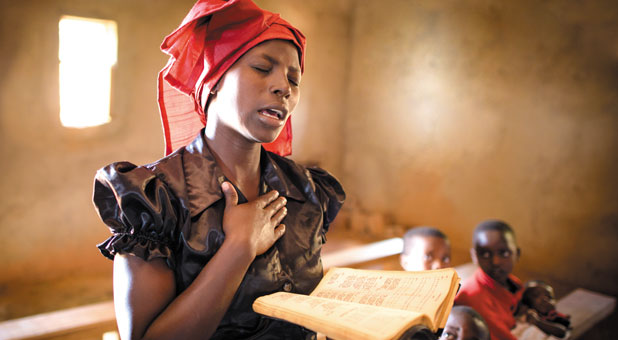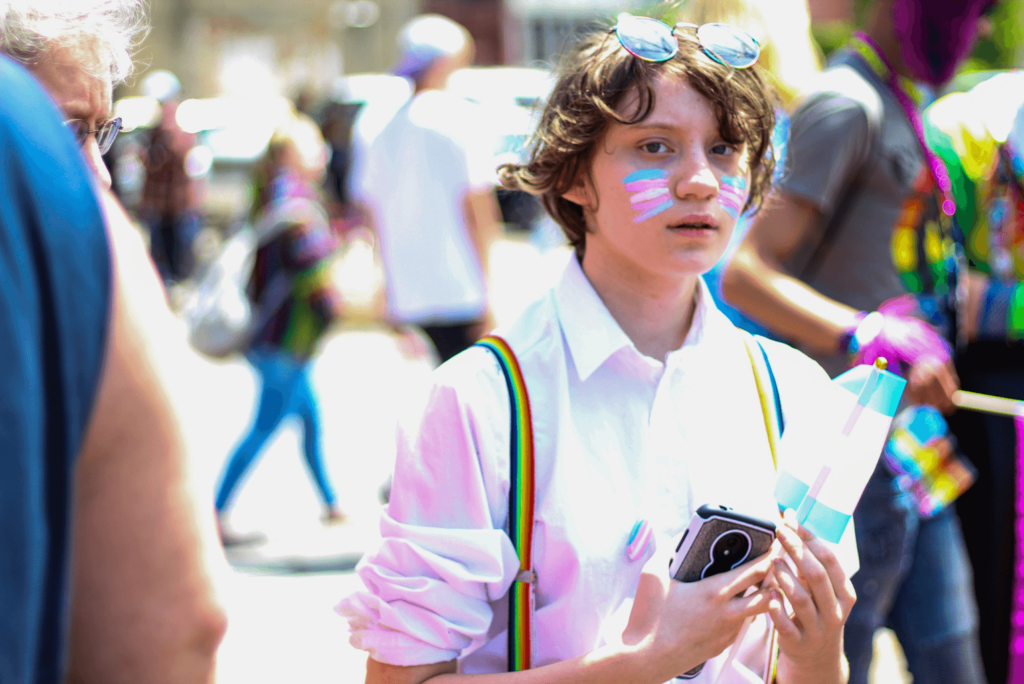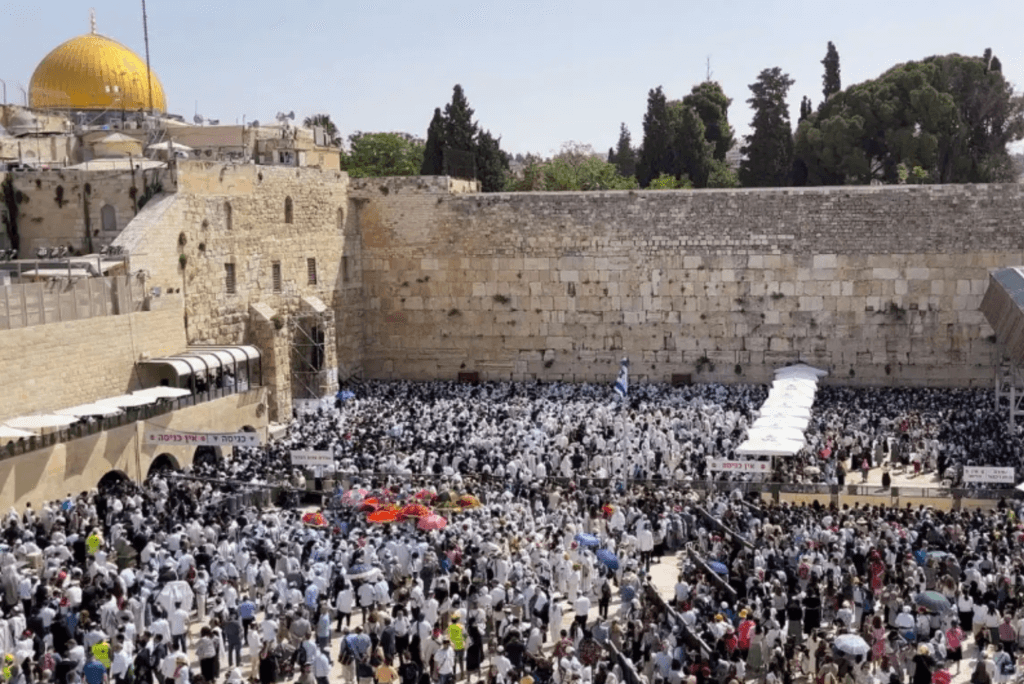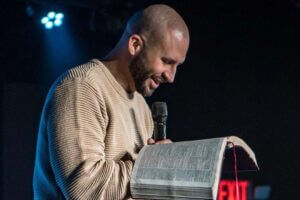Twenty-five years after the Rwandan genocide, it is hard to believe the country’s verdant hills once ran red with the blood of innocents. Yet in 1994, the world was horrified to watch as the once-peaceful agricultural nation reached a watershed of violence. Colonialism, propaganda and fear paved the way for an estimated 800,000 victims to lose their lives. For 100 days, the brutal genocide ravaged Rwanda.
World Vision recently hosted a team of journalists from Christian media outlets to observe faith’s deep impact on Rwanda’s emotional and economic recovery. Witnesses tell the same story: Only God’s grace could unite perpetrators and victims to live in forgiveness and harmony.When humanitarian aid organizations like the United Nations fled in fear, faith-based groups like World Vision pressed in. These nonprofits played a critical role, deploying physical and spiritual resources to meet the needs of the grieving country.
Ultimately, through the church, Rwandans embraced forgiveness for themselves and others. They repaired the country as people sought the Lord in the midst of slaughter. This is how God redeemed Rwanda.
Divided Society
Before colonialism, Rwanda had three classes of people, the primary two being the Hutus and Tutsis, socio-economic classes determined by the number of cows a person had. A farmer with nine or fewer cows was a Hutu; owning 10 or more cows made a person a Tutsi. A person could become a Tutsi if he acquired enough cattle.
When Europeans colonized Rwanda, they labeled these socio-economic groups as races and attempted to categorize people based on physical characteristics. The Belgians, who colonized Rwanda until the African nation gained independence in 1962, placed the Tutsis in power. This colonialism fostered racism, and resentment began to build among the marginalized Hutus.
By 1959, a Hutu uprising ended Tutsi power, and propaganda began to flood newspapers and radio, telling Hutus they must take up arms against their Tutsi neighbors. This propaganda triggered fear, and decades of indoctrination hardened many Rwandans’ hearts.
Embittered Hutus took prominent government positions and fostered thinking that Tutsis were dangerous and would kill their neighbors if they were not killed first. As many as 300,000 Tutsis fled Rwanda during the 1959-1961 Hutu revolution, leaving the remaining Tutsis as an even smaller minority.
In 1973, Juvenal Habyarimana, a Hutu, took control of the country and in 1975 founded a political party, the National Revolutionary Movement for Development (NRMD). In 1990, refugee Tutsis, who formed the Rwandan Patriotic Front (RPF), invaded the country. Habyarimana began negotiations with the group in 1992, ultimately leading to a ceasefire.
Despite the negotiations, hatred grew. Fed up after decades of discrimination, extremist Hutus sought European help for military training. The French allegedly prepared the Hutus for this massacre, training and arming soldiers so they could attack. Subsequent international investigations were inconclusive about the French involvement in the Rwandan genocide, but in 2010, during a visit to Rwanda, French President Nicolas Sarkozy acknowledged that France made “mistakes” during the genocide.
Allegedly armed with French training and weapons, extremist Hutus carried out experimental, “mock” genocides in the early 1990s. One such experiment in 1992 left 300 Tutsis dead. By April 1994, the country was primed for slaughter.
High-powered Hutus sat in prime government positions and embraced the messages of fearmongers: Kill the Tutsi, or they will kill you. Moderates Habyarimana and Burundi President Cyprien Ntaryamira, both Hutus, were returning from peace negotiations when their plane was shot down, and chaos broke out.
Blood and Betrayal
More than 800,000 people, Tutsis and Tutsi sympathizers (or “lovers”), would die in the next 100 days. Friends betrayed their oldest confidants. Neighbors went door-to-door with machetes. Entire communities that once dealt with the tension exploded as if fault lines rumbled beneath the community.
In one attack, Hutus cornered Tutsis in a sporting events stadium. Families watched loved ones die and used faith to ease the pain.
“They were baptizing one another in blood, in the name of the Father, Son and Holy Spirit,” a survivor of this attack said during a presentation at the Kigali Genocide Memorial.
The memorial serves as a way to honor the victims and educate the current generation of Rwandans, as well as tourists, about the genocide’s devastation. The memorial sits on a hill above a mass grave where an estimated 50,000 bodies are buried. Only a few thousand have been identified, and their names are engraved on a wall at the memorial.
The exhibits haunt visitors, as cases of bones line one room and bloodied clothes hang in another. One area is devoted to the children murdered in the genocide, with descriptions of their deaths.
“Eyes plucked out,” reads one placard below the portrait of a child.
“Smashed against a wall,” reads another.
“Hacked to death,” read too many labels.
For many Rwandans, though, genocide stories live on beyond the walls of a museum.
World Vision connected journalists with Alice Mukarurinda, a genocide survivor. Mukarurinda says her own baby was sliced in half before her eyes. Sitting with journalists in her bright blue living room, she peeled her rainbow dress off her left shoulder to reveal deep machete scars along her back and upper arm.
Her right hand was hacked off by a machete. The valley of the scar on her temple serves as a permanent reminder of the trauma she endured at a neighbor’s hand.
Mukarurinda’s father was killed in 1991 in an attack leading up to the genocide. His body was never found. Her mother and siblings were burned alive at a local church. Mukarurinda sought refuge in another church, but Hutus set that structure on fire, and she fled for her life.
On April 29, 1994, her neighbor, Emanuel Ndayisaba, attacked her with a group of his friends.
“He hit me in the face with something that had nails on it,” she recalls. “You can’t think. You don’t know who is doing what.”
The deep scars and mutilated arm? Ndayisaba’s doing. Trauma keeps Mukarurinda from accessing most of her memories.
What she does recall is devastating. Mukarurinda says people were throwing away bodies like trash. Dogs ate maggot-filled human remains.
“I didn’t eat, sleep or drink,” she says.
Mukarurinda ended up in a body of water with no memory of how she got there, her left side paralyzed from the attack. Eventually, the RPF found her and took her to a refugee camp. Mukarurinda spent two months in recovery, attempting to gain mobility back in her left side.
As heartbreaking as Mukarurinda’s story is, it’s far from unique. Andrew Birasa and Callixte Karemangingo were friends and neighbors before the genocide.
Yet when the Hutus attacked, Karemangingo took up arms against the Birasas. Though Birasa was a Hutu, he married Madrine, a Tutsi.
“Andrew was considered an enemy as well,” Karemangingo says.
Karemangingo led Hutu fighters to Tutsis who were in hiding, including Birasa’s in-laws.
“Andrew was in favor of the Tutsi and even hid some of them,” Karemangingo says. “He faced many challenges because he was supposed to be killed.”
Despite years of friendship, the propaganda, fearmongering and groupthink led Karemangingo to betray his neighbor.
The betrayal hurt Birasa on many levels.
“I had a lot of anger and resentment for him and what he had done,” Birasa says. “I felt like he deserved to die.”
In July 1994, though, the genocide came to a crashing halt. The RPF, led by Paul Kagame, seized control of the capital city of Kigali. Because the national justice system was not equipped to handle the extensive crimes, villages set up local courts, called “gacaca courts,” to pursue justice. Villagers could prosecute perpetrators and seek justice on a local level.
Birasa turned in Karemangingo.
What could have been a bitter, painful process took a restorative turn. Gacaca courts allowed perpetrators to seek forgiveness from their victims and do community service in exchange for sentence commutation.
When the hacking ceased, healing could begin.
Finding Faith
“The church played a very important role [in healing after the genocide],” says Ananias Sentozi, World Vision’s Rwanda programs director. “The priority to us was the soul, the heart, the emotions of the people. I can tell you, there were not other more competent organizations, people or structures or systems that could address those [needs] more than churches.”
World Vision, a faith-based humanitarian aid organization, launched its Rwandan efforts in the midst of the genocide by providing emergency aid to refugees. This included pots, pans, food, medical attention and even care for orphans of the genocide. The organization also partnered with local churches to address the spiritual wounds of the victims and perpetrators.
“Churches played a role of bringing people together, preaching forgiveness, healing wounds, uniting people, bringing people together, praying for all the souls and the healing,” Sentozi says. “[Churches were] coaching, mentoring, visiting, staying close to the people and the number of gatherings that were running here to create awareness of people coming back together, forgiving and living in peace.”
World Vision’s reconciliation process follows a specific model that endures today—a two-week program of sharing intensely personal memories of the genocide, learning new tools to manage deeply painful emotions and considering a path to forgiveness.
The training has three components: bereavement, dealing with emotions and forgiveness. Those who had participated in the genocide were brought face to face with, or wrote letters to, the people who had been victims. The approach was replicated throughout the country and embraced by the new government. The process met resistance at first, and sometimes hearts took years to change, but in case after case, it worked.
Reconciliation is evident in the lives of Karemangingo and Birasa, and Mukarurinda. Mukarurinda began her process in the refugee camp. The first miracle was her discovery that her husband was alive. Then she found a Bible and began to meditate on Scripture. As she read Matthew 5, the Holy Spirit convicted her that if she did not forgive others, she would not inherit the kingdom of God.
“Even though I wanted to forgive them, I still felt a lot of fear and pain,” Mukarurinda says. “I spent a lot of time crying.”
But eventually, she says, “I forgave all Hutus, and I asked God for more kids to take away the pain.”
She connected with World Vision in 1997 and worked through its forgiveness process.
“I still remember, even though it’s been a long time,” Mukarurinda says. “They helped our spirits and souls—not just our bodies, but the insides.”
Despite her healing journey, she still fainted when Ndayisaba, the man who mutilated her, asked her for forgiveness as part of the gacaca courts’ process.
“Emanuel came slowly approaching me,” Mukarurinda recalls. “He got down on his knees. He was sweating nervously and asked for my forgiveness sincerely. He said he was the one who chopped off my arm, and his colleagues killed my daughter. I couldn’t believe it. In my mind, it all got black. I fainted, and they took me to the hospital.”
Mukarurinda says she and her husband made the decision that week to forgive Ndayisaba because, “God was with us, and that’s what made us to forgive him. … I felt a release of freedom and peace because he had the courage to ask forgiveness.”
Ndayisaba planted a lemon tree on Mukarurinda’s property as a permanent reminder of the fruit forgiveness can bear. The two are now part of a reconciliation group that unites victims and perpetrators for the purpose of healing.
Members of the group meet together regularly to pray and speak to youth to educate them on the transformative power of forgiveness and abiding in supernatural grace.
Restoration also took place in Karemangingo and Birasa’s lives, but in a different location. Karemangingo was behind bars in February 2000 when he encountered the Holy Spirit and repented on the spot. He confessed his sins, which included crimes against humanity, and called out for the Lord to save him. He was immediately baptized in the Spirit and given the gift of prophecy.
“What I got [from the Holy Spirit] as I became a Christian was ‘Whoever does not repent will not be forgiven,'” Karemangingo says. “I stood on those teachings [and] chose to ask forgiveness for those crimes. I told the court of those crimes, admitted and confessed.”
Karemangingo picked up a guitar, and prophecies started flowing through the chords. The Holy Spirit gave him the words in his heart, and his ministry exploded.
Revival spread in the prison. Through Karemangingo’s teachings and prophecies, at least 8,600 other inmates came to know Christ and also requested forgiveness.
“I was also teaching about peace and reconciliation,” Karemangingo says.
When the gacaca courts released Karemangingo, the Holy Spirit prompted him to return to his neighbors, the Birasas. Through providence, the couple were also believers.
“Asking forgiveness from Andrew and his wife was not that difficult because they are both Christians,” Karemangingo says. “They forgave me, but just barely. Andrew and his wife pardoned me.”
The two families rebuilt their relationships from the ground up, using grace as their guide. Today, Birasa says, “we are good friends.”
“We work together in a way that bears fruit,” Karemangingo says. “It makes me happy that our wives are so close, they have one heart.”
What’s more, their children are in love and planning a wedding after they finish school.
“It’s God who did this,” says Marcella, Karemangingo’s wife. “With human strength, it would not be possible.”
The church stepped in after bloodshed, and the result is still palpable among the nation. Through healing of the heart, the country repaired itself emotionally, physically and spiritually.
Though Rwanda still mourns its genocide, faith and forgiveness reign in the hearts of its people. Where Rwanda was once a cautionary tale of hatred, the country is now a model for the world of what can happen when people surrender to supernatural grace.
To listen to our on-the-ground reporting on Rwanda, click the podcasts below:
On the Ground in Rwanda With Brian Duss
On the Ground in Rwanda With Callixte Karemangingo
On the Ground in Rwanda With Mary Goreph Mukazimpaka
On the Ground in Rwanda With Bosco Hadaruma
On the Ground in Rwanda With Ananias Sentozi {eoa}
READ MORE: To hear more testimonies of healing and transformation in Rwanda, go to rwanda.charismamag.com.
Jessilyn Lancaster is online news director for Charisma Media.
See an error in this article?
To contact us or to submit an article




















